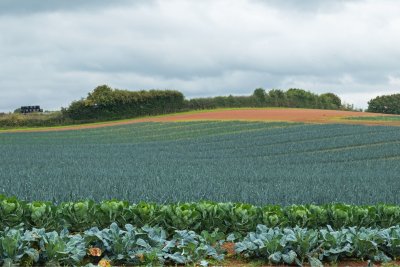How to use planning policy to support local sustainable food and farming.
Why we made this guide
Food is a critical part of the UK’s national infrastructure. Farming shapes around 70% of our land, and food is our largest manufacturing sector. The policies that shape our food system acutely impact rural economies, as well as access to healthy, sustainable food for everyone. Agriculture is responsible for a third of global greenhouse gas emissions and the greatest threat to the world’s ecosystems.
Decisions about food and farming are therefore critical planning issues.
Sustain: the alliance for better food and farming has worked with farmers and planning officers to make this toolkit and share best practice on planning policies that support a transition to sustainable farming.
Simple and clear policies will lift barriers in the planning system and help to unlock a transition to sustainable farming that diversifies farmer incomes, produces healthier food and makes our food system more resilient to climate change and market shocks.
These policies are also designed to help English councils respond to an increase in the number and complexity of applications for intensive livestock developments. The waste from intensive livestock developments has had a devastating impact on England’s rivers, while creating air pollution and degrading soil quality.
The pollution from intensive livestock units means councils are facing emerging legal risks. Key decisions in recent years have clarified the responsibility on councils to prevent the harm from intensive livestock units. They include:
- Not relying on other regimes to prevent pollution (such as the Farming Rules for Water) when it is clear these aren’t effective (The National Farmers’ Union v Herefordshire Council 2025) or when these don’t include monitoring of pollution in their scope (Squire v Shropshire Council 2019).
- A requirement for planning applications to contain a slurry waste management plan for the whole agricultural unit, including on-site and off-site activities (The National Farmers’ Union v Herefordshire Council 2025 and Squire v Shropshire Council 2019).
- Considering off-site waste spreading (including that produced in downstream processes such as digestate produced from anaerobic digestion) as part of an Environmental Impact Assessment (EIA) (Caffyn v Shropshire Council 2025).
- For proposals within river catchments of special areas of conservation, a requirement for nutrient neutrality is justified if supported by the Environment Agency (The National Farmers’ Union v Herefordshire Council 2025).
- That planning Authorities must assess and account for the cumulative impacts of increasing intensive agricultural developments in specific river catchments (Caffyn v Shropshire Council 2025).
- A requirement for a comprehensive Environmental Impact Assessment that includes an assessment of the direct and indirect greenhouse gas emissions of the proposed development (Finch v Surrey County Council 2024).
More information on these rulings can be found in the Legal risk section.
As many local planning authorities are in the process of reviewing their local plans, now is an opportune time to ensure local planning supports the growth of a vibrant and sustainable local food and farming system.
Thank you to the farmers and planning officers that contributed to this toolkit. It is intended as a guide and should be adapted to best suit your local context. It is not legal advice. If you have a food strategy, your local plan should support this.
The toolkit
- How to use the toolkit
- The national policy context
- Environmental Impact Assessments and Habitat Regulations assessments
- Policies to include in your local plan
- Checklist for intensive agriculture development compliance with planning policy and legal precedent
- Glossary and further resources
- Evidence base
- Legal risk
Find out more
Organically grown leek crop in a Devon field. Copyright: istock
